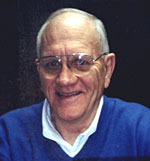
Commentary: Neil Haugerud
April 2000
| |
|
|
|
||
Recently, at age 67, while on a writing assignment in Iowa, I was arrested for the first time. I'd come upon two police officers fussing with a ragged man on a bench. I thought I would jot down my observations, but the policemen told me to move on.
Knowing full well there's no law against observing officers, I declined. So, I was arrested and jailed overnight for not doing as I was told. I think it's a prime example of modern day police becoming "the law" rather than representing the law.
In Minnesota I have also noticed how licensing of police has been detrimental to rural peace keeping. Most good policing comes as a result of the knowledge of your area and the people.
Prior to the licensing law, rural communities hired mature local citizens as police officers. These officers were regularly able to eliminate 90 to 95 percent of the people as suspects or troublemakers, because they were familiar with the community.
Now, small towns generally have to hire total strangers - young, immature officers. These officers arrive in town insecure and scared. After they get to know the area and become somewhat mature, they generally gravitate to a larger department and the small community has to repeat the ineffective process.
I'll give you an example from personal experience how policing has changed in the last few decades.
During my recent incarceration, I asked a deputy if I could arrange to get a medical device for my ankle from my hotel room a few blocks away. I was under doctors' orders to use it every morning.
"We don't do stuff like that," he growled.
Then I recalled a Sunday morning long ago when I'd responded to a knock on the jail door.
"Sheriff, I've got to check my trap line," Joe Drury said. "Sometimes farm dogs get caught in my traps."
I'd locked Joe up the previous night for his part in a barroom brawl. Charlie McMurphy, called from the back cell. He'd gotten drunk and was locked up the previous afternoon. Now he pleaded with me to get out so he could milk his cows.
I figured Joe and Charlie weren't bad guys, so I let Charlie off at his farm while Joe and I checked the trap line. It took us nearly an hour and, sure enough, there was a farm dog caught in one of the traps. I had Charlie and Joe back in jail before lunchtime.
But that was long ago. Sure, times have changed, but it seems we should give credit for judgment, experience and maturity when licensing potential police officers. I wouldn't have the qualifications to be a candidate for sheriff in light of today's regulations.

